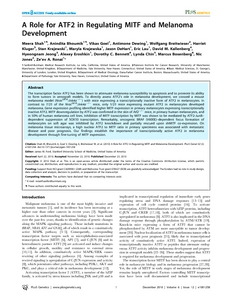Shah, M;
Bhoumik, A;
Goel, V;
Dewing, A;
Breitwieser, W;
Kluger, H;
Krajewski, S;
Krajewska, M;
Dehart, J;
Lau, E;
et al.
Shah, M; Bhoumik, A; Goel, V; Dewing, A; Breitwieser, W; Kluger, H; Krajewski, S; Krajewska, M; Dehart, J; Lau, E; Kallenberg, DM; Jeong, H; Eroshkin, A; Bennett, DC; Chin, L; Bosenberg, M; Jones, N; Ronai, ZA
(2010)
A Role for ATF2 in Regulating MITF and Melanoma Development.
PLOS GENETICS, 6 (12).
ISSN 1553-7390
https://doi.org/10.1371/journal.pgen.1001258
SGUL Authors: Bennett, Dorothy Catherine
![[img]](https://openaccess.sgul.ac.uk/107201/1.hassmallThumbnailVersion/A%20Role%20for%20ATF2.pdf)  Preview |
|
["document_typename_cannot open `/data/SGUL/sgul/eprints3/archives/sgul/documents/disk0/00/10/72/01/01/A' (No such file or directory)
cannot open `Role' (No such file or directory)
cannot open `for' (No such file or directory)
cannot open `ATF2.pdf' (No such file or director" not defined]
Published Version
Download (8MB)
| Preview
|
Abstract
The transcription factor ATF2 has been shown to attenuate melanoma susceptibility to apoptosis and to promote its ability to form tumors in xenograft models. To directly assess ATF2's role in melanoma development, we crossed a mouse melanoma model (Nras(Q61K)::Ink4a⁻/⁻) with mice expressing a transcriptionally inactive form of ATF2 in melanocytes. In contrast to 7/21 of the Nras(Q61K)::Ink4a⁻/⁻ mice, only 1/21 mice expressing mutant ATF2 in melanocytes developed melanoma. Gene expression profiling identified higher MITF expression in primary melanocytes expressing transcriptionally inactive ATF2. MITF downregulation by ATF2 was confirmed in the skin of Atf2⁻/⁻ mice, in primary human melanocytes, and in 50% of human melanoma cell lines. Inhibition of MITF transcription by MITF was shown to be mediated by ATF2-JunB-dependent suppression of SOX10 transcription. Remarkably, oncogenic BRAF (V600E)-dependent focus formation of melanocytes on soft agar was inhibited by ATF2 knockdown and partially rescued upon shMITF co-expression. On melanoma tissue microarrays, a high nuclear ATF2 to MITF ratio in primary specimens was associated with metastatic disease and poor prognosis. Our findings establish the importance of transcriptionally active ATF2 in melanoma development through fine-tuning of MITF expression.
| Item Type: |
Article
|
| Additional Information: |
© 2010 Shah et al. This is an open-access article distributed under the terms of the Creative Commons Attribution License, which permits unrestricted use, distribution, and reproduction in any medium, provided the original author and source are credited. |
| Keywords: |
Science & Technology, Life Sciences & Biomedicine, Genetics & Heredity, GENETICS & HEREDITY, ACTIVATING TRANSCRIPTION FACTOR-2, SIGNAL-TRANSDUCTION PATHWAY, MALIGNANT-MELANOMA, TISSUE MICROARRAYS, CELL PROLIFERATION, EXPRESSION, SURVIVAL, INHIBITION, PROMOTER, BIOLOGY |
| SGUL Research Institute / Research Centre: |
Academic Structure > Molecular and Clinical Sciences Research Institute (MCS) > Cell Sciences (INCCCS) |
| Journal or Publication Title: |
PLOS GENETICS |
| Article Number: |
e1001258 |
| ISSN: |
1553-7390 |
| Dates: |
| Date |
Event |
| 2010-12-01 |
Published |
|
| URI: |
https://openaccess.sgul.ac.uk/id/eprint/107201 |
| Publisher's version: |
https://doi.org/10.1371/journal.pgen.1001258 |
Statistics
Item downloaded times since 30 Jan 2015.
Actions (login required)
 |
Edit Item |


